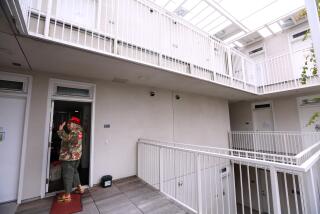Bill Would Hit Drivers, Aid Schools : Fines: The measure calls for a surcharge on parking tickets. It would pay for stronger security and anti-violence programs on campuses.
- Share via
SACRAMENTO — Motorists would be drafted into the war on school violence under controversial legislation that calls for boosting the cost of parking tickets by more than half.
The measure, backed by teachers in the violence-ridden Los Angeles Unified School District, would raise at least $85 million a year to pay for beefed-up security on school campuses, alternative education programs for delinquents and special training for teachers and administrators statewide.
But the proposal by Sen. Teresa Hughes (D-Inglewood) is being attacked by those who typically champion law-and-order issues, including law enforcement organizations, because of the way it would be financed.
Money to stem school violence would come both from a share of assets forfeited in drug seizures--all of which now go to law enforcement--and from a surcharge on parking tickets. Parking violations would go up $5 for every $10 in fines or fraction thereof. The surcharge on a $23 parking ticket would be $15, raising the total cost to $38.
“I let a meter run out on my car in front of the state Capitol, what possible connection is there between that and campus violence?” asked Assemblyman Richard L. Mountjoy (R-Arcadia), an opponent.
Hughes said violence on school campuses has become such a critical problem that the source of funds to deal with it should not be an issue. She said her legislation, which would pump roughly $11 million into the Los Angeles system, was designed not only to make schools safer but also to deal with some of the attitudes that have sparked the violence.
“Young people need to realize the value of life. . . . They are taking each other’s lives as if they lose a life today, they can pick up another life tomorrow. Well, it isn’t like that,” she said.
Other supporters cited specific campus shootings in Los Angeles as evidence of the increasingly violent learning environment. In January, a 16-year-old Fairfax High School football player was shot to death in a classroom, and a month later, a Reseda High School student was gunned down by a classmate as a dozen teen-agers looked on.
“Schools really aren’t prepared to deal with violence. They are ill-equipped to handle kids coming on campus with guns and knives,” said Dave Low, lobbyist for the School Employees Assn.
With state and local government budgets stretched and the public opposed to tax increases, backers said the least objectionable way to address the problem is to make parking violators shoulder the cost.
The bill, which surfaced in its present form 10 days ago, won support last week from the Assembly Education Committee and is expected to be heard by the Assembly Ways and Means Committee later this week. Hughes is optimistic that it will pass both houses and win Gov. Pete Wilson’s signature. However, Low acknowledges that it faces powerful opposition.
The goals of the legislation are supported even by its opponents, but the proposal has attracted criticism from organizations such as the League of California Cities, which see it as encroaching on a source of their revenue.
Law enforcement organizations object to provisions that would give schools assets that are seized from drug dealers arrested within 1,000 feet of campuses. Those monies now go to local law enforcement.
Judi Smith, a lobbyist for the cities league, said the new surcharge would make parking tickets so expensive that cities would be precluded in the future from increasing fines when they needed additional revenue.
Smith said cities would also have to absorb the costs of administering the new surcharge and cope with any additional collection problems it might cause. Historically, a large increase in the level of fines has led to a drop in the number of people willing to pay them.
“It’s not that cities oppose any type of funding for programs to deal with violence in the schools or that we don’t want that problem to be addressed,” she said. “But it shouldn’t be at our expense in a year when cities and counties are already being hit by having our property tax revenues shifted to schools.”
Hughes accuses the opposition of shortsightedness. “Everybody is paranoid now with limited funding and everybody feels that this particular money is theirs. But these children are ours and this is what we have to do to protect them,” she said.
More to Read
Sign up for Essential California
The most important California stories and recommendations in your inbox every morning.
You may occasionally receive promotional content from the Los Angeles Times.










